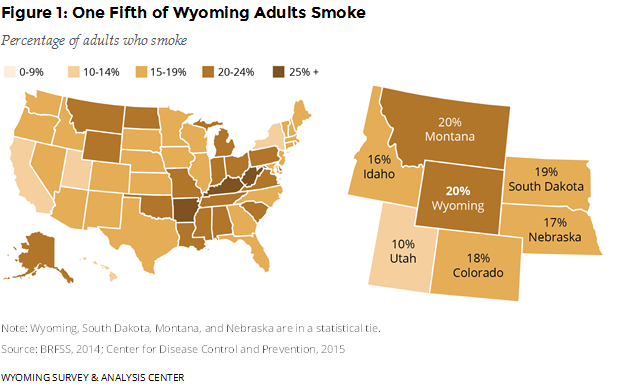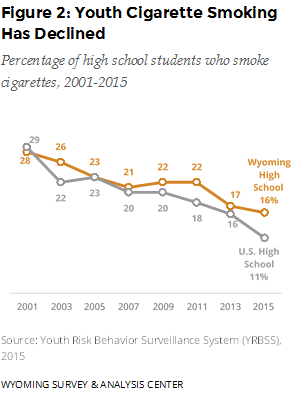Introduction
The Impact of Tobacco in Wyoming: 2016 Annual Summary provides data on the prevalence of tobacco use and data associated with the four goals of the Wyoming Tobacco Prevention and Control Program:
- Reduce youth initiation
- Reduce exposure to secondhand smoke
- Promote tobacco cessation
- Minimize disparities in the burden of tobacco use.
This Annual Summary also includes a discussion about the health and economic burdens of tobacco use in Wyoming. In reporting the data, the Wyoming Survey & Analysis Center (WYSAC) at the University of Wyoming uses the data sources’ conventions for ascertaining statistical significance and for reporting confidence intervals. Using those criteria (generally an alpha of .05 for statistical tests or 95% confidence intervals), WYSAC identifies as significant only differences or relationships that have been identified by the data sources as statistically significant or where confidence intervals do not overlap. The references list at the end includes information for materials cited in this document.
Prevalence of Tobacco Use
Adult Cigarette Smoking
 Current smokers are those who reported smoking at least 100 cigarettes in their lifetime and currently smoke every day or some days. According to the 2014 Behavioral Risk Factor Surveillance System (BRFSS), 20% of Wyoming adults smoke, slightly higher than the national median of 18%. Wyoming, South Dakota, Montana, and Nebraska are in a statistical tie for the highest smoking rate in the region defined by Wyoming and the six bordering states (Figure 1). The smoking rate in Wyoming has declined since 2011, when the smoking rate was 23%.
Current smokers are those who reported smoking at least 100 cigarettes in their lifetime and currently smoke every day or some days. According to the 2014 Behavioral Risk Factor Surveillance System (BRFSS), 20% of Wyoming adults smoke, slightly higher than the national median of 18%. Wyoming, South Dakota, Montana, and Nebraska are in a statistical tie for the highest smoking rate in the region defined by Wyoming and the six bordering states (Figure 1). The smoking rate in Wyoming has declined since 2011, when the smoking rate was 23%.
Adult Use of Other Tobacco and Electronic Nicotine Delivery Systems (ENDS)
Compared to the national median, a greater proportion of Wyoming adults use smokeless tobacco. In 2014, 5% of Wyoming adults reported using chewing tobacco, snuff, or snus every day, compared to 2% of U.S. adults (BRFSS, 2014).
Electronic nicotine delivery systems (ENDS; also known as e-cigarettes, e-cigs, or vape-pens) are battery powered devices that produce a vapor by heating a liquid instead of producing smoke from burning tobacco. Contents of the liquid vary across products, and some models allow for customized liquids. Many ENDS liquids contain nicotine. In 2014, 20% of all Wyoming adults had tried ENDS at least once (WYSAC, 2014), compared to 13% nationally (Delnevo et al., 2016). Overall, 7% of Wyoming adults used ENDS daily or some days (WYSAC, 2014), compared to 4% nationally (Delnevo et al., 2016). The majority (66%) of Wyoming adults who reported ever trying ENDS said they tried them out of curiosity. Other common reasons for trying ENDS included using them in places where tobacco is not allowed and to replace, cut down, or quit other tobacco products (WYSAC, 2014b). The U.S. Food and Drug Administration (FDA) has not approved any ENDS as a cessation aid (FDA, 2013).
In 2012, 48% of Wyoming adults and 34% of U.S. adults had tried cigars or cigarillos at least once. Of those who had tried cigars or cigarillos, 8% of Wyoming adults and 0.1% of U.S. adults had smoked them at least once in the past 30 days (U.S. Department of Health and Human Services [USDHHS], Substance Abuse and Mental Health Services Administration [SAMHSA], Center for Behavioral Health Statistics and Quality, 2014; WYSAC, 2014a).
Youth Cigarette Smoking
In Wyoming and in the United States, the cigarette smoking rate among high school students has declined since 2001, based on smoking on one or more of the 30 days prior to being surveyed. In each year, the Wyoming and national smoking rates have been similar (Figure 2; Youth Risk Behavior Surveillance System [YRBSS], 2015).
Youth Use of Other Tobacco and Electronic Nicotine Delivery Systems (ENDS)
In 2015, 12% of Wyoming high school students used smokeless tobacco in the past 30 days. This rate was significantly higher than the national rate of 7% (YRBSS, 2015).
Overall, 49% of Wyoming high school students had ever used ENDS in 2015 (the first year the YRBSS included questions about ENDS), similar to the estimate of 45% nationwide. However, a greater percentage of Wyoming high school students (30%) are current ENDS users when compared to the national estimate (24%).
Wyoming high school students reported using cigars, cigarillos, and little cigars (13% of students) similarly to the U.S. average (10% of students) based on smoking them on at least one of the 30 days prior to being surveyed (YRBSS, 2015).

